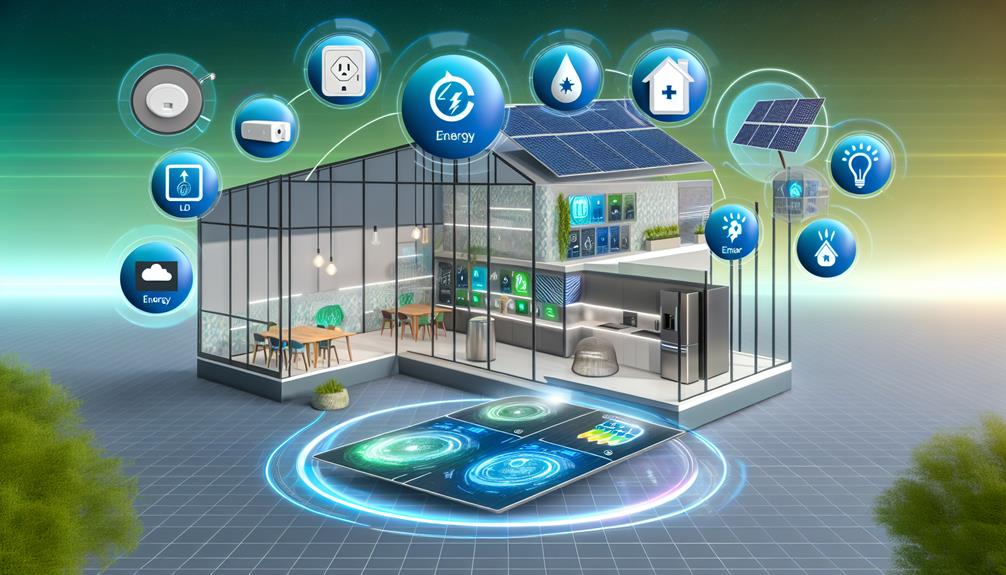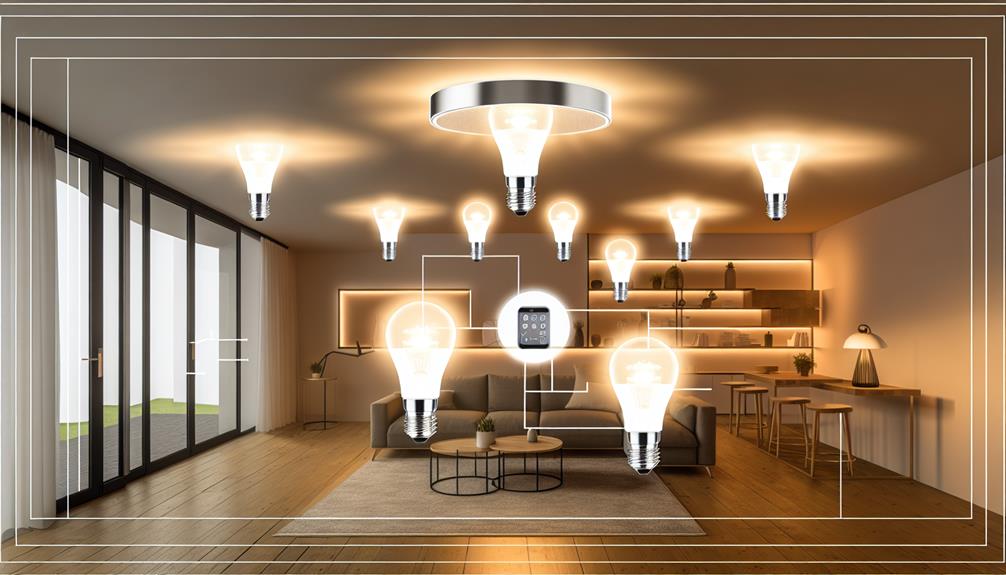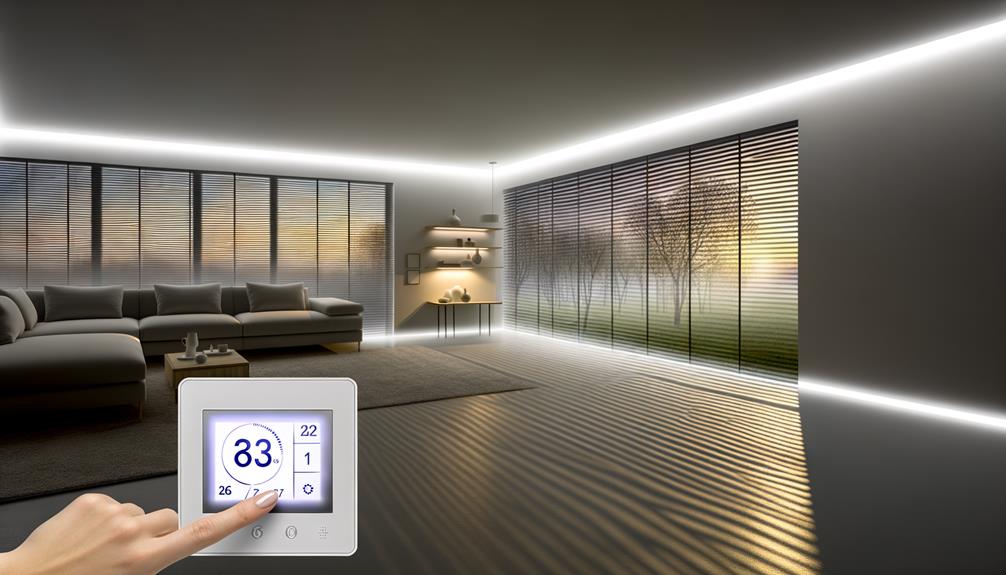Imagine stepping into a world where your home becomes an energy-conscious companion, guiding you towards a more sustainable and efficient lifestyle. Energy-efficient smart home solutions offer a glimpse into this reality, where cutting-edge technology seamlessly integrates with your daily routine.
From intelligent thermostats that adapt to your preferences to lighting systems that illuminate your space with precision, these solutions have the power to transform your home into a haven of energy efficiency.
But there's more to discover beyond the surface. Are you ready to unlock the secrets of energy-efficient smart home solutions and embrace a greener future?
Smart Home Energy Management Systems

Smart Home Energy Management Systems, also known as SHEMS, simplify and reduce energy consumption by managing smart devices in your home. These systems are designed to help you save energy and lower your utility bills.
One key component of SHEMS is the ENERGY STAR certified smart thermostat. This thermostat allows you to control the temperature of your home, ensuring that you aren't wasting energy when you're away. It can automatically adjust the temperature based on your preferences and occupancy patterns, helping to optimize energy usage.
In addition to the thermostat, SHEMS also includes other smart devices that help monitor and control energy consumption in your home. These devices can track the energy usage of appliances, lighting, and plug loads. By monitoring your energy consumption, you can identify areas where you can make changes to save energy and reduce your carbon footprint.
SHEMS also provide scheduling capabilities for your smart devices. This means you can set specific times for your devices to turn on or off, allowing you to maximize energy savings. For example, you can schedule your lights to turn off when you aren't at home or your appliances to run during off-peak hours when electricity rates are lower.
Smart Thermostats
When it comes to managing energy consumption in your home, one essential device that can make a significant impact is a smart thermostat. These thermostats are designed to save energy by monitoring and adjusting the temperature in your home, even when you're away.
In fact, smart thermostats have earned the ENERGY STAR certification, which means they've undergone independent testing to ensure their energy-saving capabilities.
Brands like NEST, ecobee, Carrier/Bryant, and EcoFactor offer different features for energy savings, allowing you to choose the right smart thermostat for your needs. Heating and cooling consume the most energy in homes, so having a smart thermostat can be particularly effective in reducing energy consumption.
The program recognizes your patterns and preferences, learning when you're home and adjusting the temperature accordingly. Additionally, smart thermostats have the ability to monitor your energy usage, providing you with data and insights on how to further save energy.
Smart Lighting

With its ability to reduce energy consumption and enhance automation, smart lighting is an essential component of a modern, energy-efficient home. Smart lighting uses 90% less energy than incandescent bulbs, making it a smart choice for energy efficiency. In fact, ENERGY STAR certified smart lighting has a life expectancy 15 times longer than incandescent bulbs, providing longevity and reducing waste.
Smart lighting not only saves energy when it's on, but also in standby mode, further reducing overall energy consumption. By programming your lights to respond to specific events or time schedules, you can enhance energy efficiency through automation. For example, you can set your lights to turn off automatically when you leave a room or adjust the brightness based on the time of day.
Choosing ENERGY STAR smart lighting is a great way to ensure energy efficiency and reduce energy wastage in your home. With smart lighting as part of your smart home energy management system, you can monitor and adjust your home's lighting to reduce and manage energy usage effectively.
Smart Appliances
Consider upgrading your home appliances to smart models for enhanced energy efficiency and advanced features. Smart appliances with connected functionality use less energy and offer convenience, savings, and smart grid capabilities. By automatically turning off when not in use, they help save money and reduce energy consumption. These appliances also offer advanced features that make daily tasks easier and more convenient.
When purchasing smart appliances, look for ENERGY STAR certification. This ensures that the product meets strict energy efficiency guidelines set by the Environmental Protection Agency. ENERGY STAR certified appliances are designed to use less energy, resulting in lower utility bills and reduced environmental impact.
One of the key benefits of smart appliances is their ability to automatically turn off when you forget to do so. This feature helps save energy and reduces the risk of accidents or fires caused by appliances left on. With smart appliances in your home, you can have peace of mind knowing that your appliances are energy efficient and safe to use.
As smart appliances become more common, manufacturers are continuously improving their energy efficiency and offering new products and services. Whether it's a smart refrigerator that tracks food inventory and suggests recipes, or a smart washer and dryer that optimize energy usage based on load size, these appliances are designed to make your life easier while saving energy.
Energy Monitoring Devices
Upgrade your smart home experience by incorporating energy monitoring devices to track and optimize your energy usage. Energy monitoring devices are an essential component of energy-efficient smart home solutions. These devices track and display real-time energy usage in your home, providing valuable insights into your consumption patterns. By understanding how and when you use energy, you can identify areas for potential savings and make informed decisions to reduce your utility bills.
Integrating energy monitoring devices with your smart home system allows for automation of energy-saving actions based on your usage patterns. For example, a smart thermostat offers the ability to adjust the temperature based on occupancy, saving energy when no one is home. Additionally, energy monitoring devices often come with mobile apps or web portals that allow for remote monitoring and control of your energy usage. This means you can make adjustments and optimize your energy consumption even when you're not at home.
Energy monitoring devices not only help you save money but also contribute to a more sustainable lifestyle. By reducing your energy usage, you can minimize your environmental impact and play a part in conserving our planet's resources.



